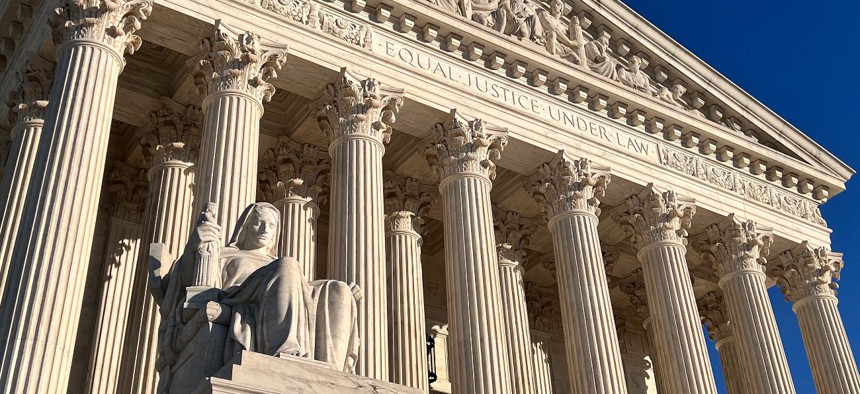
The union filed an amicus brief arguing that federal courts have been “misapplying” Thunder Basin Coal Co. v. Reich. Chip Somodevilla/Getty Images
NTEU Calls on FLRA and the Supreme Court to Clarify Policies that Hurt Unions Under Trump
The union said misapplications of standards by the agency that oversees federal labor management relations and federal courts during the Trump administration hurt their ability to represent federal workers.
The National Treasury Employees Union last week urged both the Federal Labor Relations Authority and the Supreme Court to clarify policies that labor leaders say were misapplied in ways that hurt their ability to fight anti-labor policies imposed by the Trump administration.
Over the course of the previous administration, federal employee unions found themselves engaged in litigation over an array of issues, from a trio of executive orders aimed at reducing the role of unions in federal agencies to seeking to overturn a number of Federal Labor Relations Authority decisions and policy statements that overturned decade of precedent. Although they frequently won cases against the FLRA in federal circuit court, the same court also declined to weigh in on the executive orders, finding that they lacked jurisdiction to do so.
Last week, NTEU petitioned the FLRA to change its regulations governing who can request policy statements from the agency. Over the course of the Trump administration, many of the Republican-controlled FLRA’s most controversial decisions came because agencies—and in at least one case, an advocacy group—requested they do so.
In that case, the National Right to Work Legal Defense Foundation, a conservative anti-labor advocacy group, requested the FLRA outlaw the use of official time for any lobbying activities due to the Anti-Lobbying Act. The FLRA ruled partially in favor of the organization, issuing a policy statement barring members of a federal employee union from engaging in “grassroots” lobbying, the practice by which a labor representative encourages members to contact their lawmakers to support or oppose legislation, although it preserved the right for union officials to engage in direct lobbying, like testifying before Congress.
NTEU’s request, filed just one day before FLRA Member Susan Tsui Grundmann was sworn in to secure a Democratic majority on the board, argues that the FLRA should only be able to entertain requests for policy statements from an organization that is neither a union nor an agency if the group is an “association of federal employees,” such as the National Active and Retired Federal Employee Association or the Federal Managers Association.
“The phrase ‘any lawful association not qualified as a labor organization’ is neither defined in the Federal Sector Labor-Management Relations Statute, nor in the authority’s regulations,” the union wrote. “But it is clear from the structure and purpose of the statute that the phrase was not intended to extend to any and every ‘lawful association,’ including those that have nothing to do with federal employment labor relations.”
And over at the Supreme Court, the union filed an amicus brief in support of the petitioners in Axon Enterprises v. Federal Trade Commission, a lawsuit regarding whether federal courts have jurisdiction to hear constitutional challenges in cases that ordinarily are supposed to be channeled to an administrative body like the FTC or FLRA. A three-judge panel of federal circuit court judges found that federal employee unions’ lawsuit challenging the constitutionality of the Trump-era union executive orders must first go through the FLRA before courts can weigh in.
In its brief, NTEU argued that in their challenge against the executive orders and others, federal courts have been “misapplying” Thunder Basin Coal Co. v. Reich, the case that established the “channeling” concept in federal court precedent.
“First, the Ninth Circuit and other courts of appeals have applied Thunder Basin’s ‘meaningful judicial review’ prong too strictly,” the union wrote. “Instead of considering whether meaningful judicial review ‘could’ be foreclosed, courts of appeals frequently misstate the Thunder Basin framework and hold litigants to the much more onerous standard of proving that meaningful judicial review ‘would’ definitively be foreclosed if the litigants proceeded through the administrative scheme.”
And the union noted that the question of how much weight to give to the various prongs of Thunder Basin’s methodology differs depending on which circuit hears the case, creating confusion for potential litigants.
“Courts of appeals, including the Ninth Circuit, are in discord about how to evaluate the second prong of the Thunder Basin test: whether the litigant’s claims are ‘wholly collateral to a statute’s review provisions,’” NTEU wrote. “Many courts of appeals, such as the Ninth Circuit, effectively read this prong out of the Thunder Basin framework entirely. The First, Second, Fourth, Seventh, Ninth and Eleventh circuits, in varying ways, have treated . . . ‘meaningful judicial review’ as dispositive . . . In express disagreement with its sister circuits, the D.C. Circuit has declined to hold that [the] ‘meaningful judicial review’ prong is dispositive or even the most important factor.”
Oral arguments have not yet been scheduled in the case, making it unclear when a decision may be issued.







